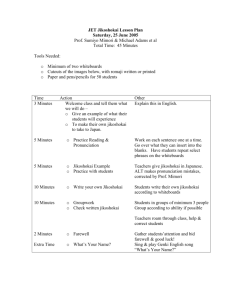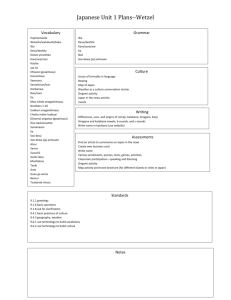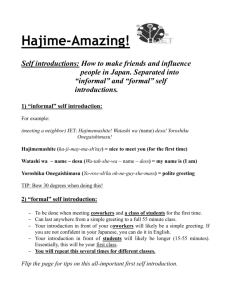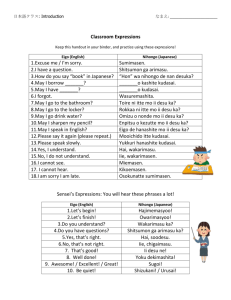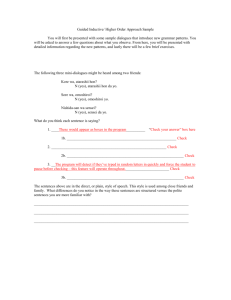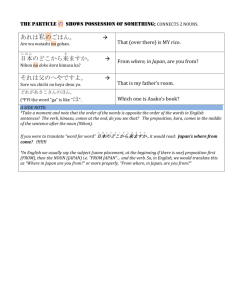Juu is-sai desu - Japanese Teaching Ideas
advertisement
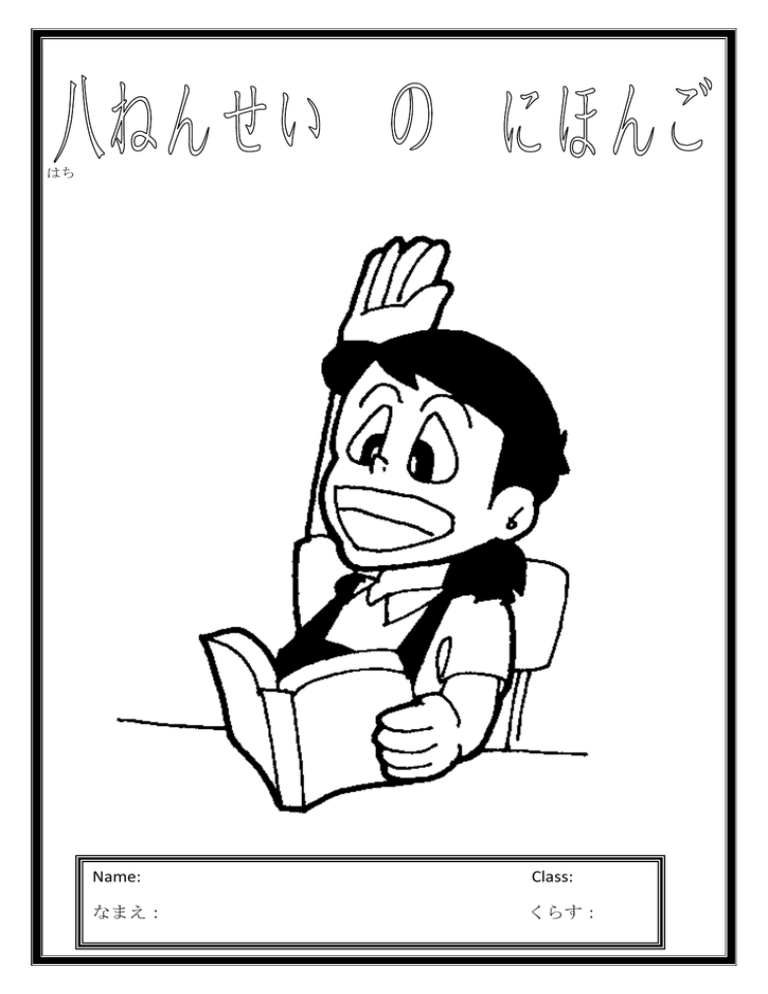
はち Name: Class: なまえ: くらす: お は よ う お o - ha - yo - u は よ う o - ha - yo - u VERSE TWO: Arigatou Arigatou こ ん に ち は kon - nichi – wa こ ん に ち は Gomen nasai Gomen nasai kon - nichi - wa Sumimasen Sumimasen Daijou bu Daijou bu VERSE THREE: さ sa - よ な ら yo - na – ra さ よ な ら sa - yo - na – ra Hajimemashite Hajimemashite Dozo yoroshiku Dozo yoroshiku Ogenki desu ka Ogenki desu ka Genki desu yo Genki desu yo ま た ら い しゅ う ま た ら い し ゅ う mata – rai – shuu From http:// www.japteach.com mata – rai – shuu Greetings Find-a-Word Write the Japanese in the practice boxes for the following English words. Then find and circle the Japanese words in the find-a-word. 1. Yes 2. No 3. Thank you 4. I am sorry 5. Excuse me 6. Good Morning 7. Good Afternoon 8. Good Evening 9. Good Night 10. Good bye よ い こ ん ば ん は が あ ご め ん な さ い と り い す ん に ら さ お が い た み は ち う よ と や え だ ま お は よ う な さ す い せ あ り が な ま し い ん す か は ら す え ら み な Match greetings to the English expressions. the following さようなら Hello おはようございます See you later おはよう Good evening じゃまたね Good morning こんばんは Good night おやすみなさい Good bye こんにちは `Mornin’ Fill in the missing hiragana letters in the following greetings. お_よ_ こ__んは さよ_な_ お_すみ__い _ま_ね おは_うご_い_す What’s your name? How to say your own name: わたし は (your name) です。 I am (your name). Asking someone their name: The most grammatically correct way to ask someone’s name is: おなまえ は なん ですか。(What The most natural way to ask someone’s name: おなまえ は? (You are?) is your name?) Task: Ask as many people as you can in 2 minutes, おなまえ Name Secret Identity は? Name Secret Identity Introducing yourself Read the first two speech bubbles. Complete the blanks so that the people are introducing themselves はじめまして。 ぼく の なまえ は じょん です。 こんにちは。 はじめまして。 わたし は さまんさ です。 こんにちは。 ________________ _______ __ ________ __ あけぼの ________________ ________________________ ___________________________________________ ________________________ (Tom) Draw a picture of yourself, and write an introduction _____ From http://www.languageteachers.net/ Numbers 1-10 Itchy Lock いち ろく c t c h Knee nana に なな Sun さん hatch はち She queue し きゅう Ju (-do) go じゅう ご 1 1 一 一 一 一 一 2 二 二 二 二 二 1 2 3 三 三 三 三 三 1 3 2 四 4 5 四 四 四 四 1 3 4 2 五 五 五 五 五 3 1 六 2 4 六 六 六 六 七 七 七 七 七 1 2 1 2 1 八 八 八 八 八 2 九 九 九 九 九 2 1 十 十 十 十 十 一 七 八 二 三 九 十 七 二 二 六 一 七 六 五 四 二 一 二 三 五 五 四 九 二 四 三 一 八 一 十 八 六 二 一 五 二 六 四 五 四 三 四 九 八 五 三 十 四 Help the 2 ants find the cake in the kanji number maze by following the numbers 1 to 10. Then count how many of each number are left in the puzzle. Write your answers in kanji numbers in the tally box below, Tally 一+九= 五+五= 八+ニ= 六+四= 三+七= 二+三= 一+四= 四+四= 一+七= Help the ant to find the cake by following the numbers 1-20 in the maze below. Asking telephone numbers: でんわ ばんごう は なん ですか。 What’s your telephone number? (four numbers) の(four numbers) です。 It’s (give the numbers in your telephone number). Task: You have 2 minutes to ask as many people as you can their telephone number. なまえ でんわ ばんごう Task: Write the following telephone numbers in kanji: Your number: の Saint Mary’s College: の A Friend’s telephone number: の Lyrics: Nan sai desu ka Movement: Clap clap clap clap Nan sai desu ka Clap clap clap clap Nan sai desu ka Clap clap clap clap Juu sai desu Show 10 fingers Juu is-sai desu Show 11fingers Juu ni-sai desu Show 12fingers Juu san-sai desu Show 13fingers Juu yon-sai desu Show 14fingers Juu go-sai desu Show 15fingers Juu roku-sai desu Show 16fingers Juu is-sai, Juu ni-sai, Juu san-sai Jump Jump Jump Juu yon-sai, Juu go-sai, Juu roku-sai Jump Jump Jump To the GenkiNet Japan numbers 1-20 You Tube rap. From http:// www.japteach.com From http:// www.japteach.com とし toshi How old are you? Q. 何 才 です か nan sai desu ka I am ….. years old A. number 才 です。 sai desu. Use the chart to find out how old you are. Practise saying the ages aloud. えいご 日本語 Kanji かんじ 1 year old issai 一才 2 years old nisai 二才 3 years old sansai 三才 4 years old yonsai 四才 5 years old gosai 五才 6 years old rokusai 六才 7 years old nanasai 七才 8 years old hassai 八才 9 years old kyusai 九才 10 years old jussai 十才 11 years old juuissai 十一才 12 years old juunisai 十二才 13 years old juusansai 十三才 14 years old juuyonsai 上四才 Handy Hint: Remember when you are talking about age to always use ‘yon’ for number four and ‘nana’ for number seven. Also, can you see how number 1, 8 and 11 are a little different to ‘ichi,hachi and juichi’? This is because these numbers change when we are talking about age. Ichi becomes iss and hachi becomes hass! あんけーと Task: You have 2 minutes to ask as many people in class how old they are. Don’t forget to ask: なんさい なまえ です か。 とし Task: Answer the following questions in your Japanese workbooks. 1. まどんな さん は なんさい です か。 2. れいでぃー・がーが さん は なんさい 3. ろばーと・ぱてぃんそん さん は 4. みーがん・ふぉくす さん なんさい です は さんさい 5. じゃすてぃん・ばいべー さん は です か。 か。 です か。 さんさい です か。 How do you say the following in Japanese? What grade are you in? _________________________________________________ I’m in grade 8. ____________________________________________________ Explanation: To say what grade you are in use the following pattern. School grade + = I’m in grade ….. ねんせい です。 ‘ねん’ means year. ‘せい’ means student (as in the word ‘せいと’). Together, these two words mean “a student of Year …..”. Task 1: Read the speech bubbles and translate them into English on the right hand side. こんにちは。わたしは ばーと です。八才です。三ねんせい ______________________________ です。 ______________________________ ______________________________ ______________________________ おはよう ございます。わたしは りーさ です。 七才 です。二ねんせい です。 ______________________________ ______________________________ _______________________________ はじめまして。わたしは るーし です。 十三才 です。八ねんせい です。 ________________________________ ________________________________ Task 2: In your Japanese books draw a picture of yourself. In a speech bubble introduce yourself in Japanese. Include a greeting, your name, age and grade. From http://www.languageteachers.net/ COOKING りょうり(RYOORI) READING どくしょ(DOKUSHO) STAMP COLLECTING SHOPPING SPORT きってしゅうしゅう (KITTESHUSHU) かいもの (KAIMONO) すぽーつ(SUPOOTSU) DRAWING え (E) DANCING だんす (DANSU) COMPUTERS ぱそこん (PASAKON) じょうば (JYOOBA) HORSE RIDING はいきんぐ (HAIKINGU) HIKING おんがく を きくこと (ONGAKU WO KIKUKOTO) LISTENING TO ぴあの (PIANO) すいえい (SUIEI) PIANO SWIMMING MUSIC When talking and asking questions about hobbies use the following sentence patterns. Talking about your hobby/hobbies わたし の しゅみ は ___ です。 Watashi no shumi wa_____desu Example: わたし の しゅみ は だんす です。 Watashi no shumi wa dansu desu. My hobby is reading. LISTING MORE THAN ONE HOBBY!! Particle と(to) is used to list more than one thing. と=and Example: わたし の しゅみ は かいもの と りょうり です。 Watashi no shumi wa kaimono to ryoori desu. My hobbies are shopping and cooking. Asking about hobbies しゅみはなんですか。 Shumi wa nan desuka What is your hobby? To answer, you can either say: しゅみは___です。 Shumi wa ______desu. Or (hobby)です。 Interview 5 people in the class and find out what their hobby is. Ask: しゅみ は なん ですか Shumi wa nan desuka Reply: (hobby) です。 desu なまえ しゅみ 一 二 三 四 五 Each person reports back to the class about someone they have interviewed. __________さん の しゅみ は____________です。 san no shumi wa desu Example: Mary さん の しゅみ は りょうり です。 san no shumi wa ryoori desu. Mary’s hobby is cooking. Saying Likes and Dislikes I Really like / I love: • (Thing you like) が だい • ( Thing you like) ga dai • Eg: Banana が すき Banana だい ga dai すき です。 suki desu. です。 suki desu I like: • (Thing you like) が すき です。 • ( Thing you like) Ga Suki Desu. • Eg: ぴざ が すき piza ga suki です。 desu. I Don’t like: • (Thing you dislike) • ( Thing you dislike) • Eg: へび は hebi wa すき は すき じゃ ない wa suki ja nai desu. じゃ ない です。 suki ja nai desu. I Don’t like: • (Thing you dislike) • ( Thing you dislike) • Eg: がっこう は gakkoo wa きらい は きらい です。 wa kirai desu. です。 suki ja nai desu. です。 たんご Vocabulary Greetings and farewells にほんご Romaji ohayoo greeting in the morning ohayoo gozaimasu greeting in the morning (polite) konnichiwa greeting in the afternoon konbanwa greeting in the evening oyasumi nasai sayoonara ばいばい English good night (said when you go to bed) good bye ja, mata see you (later) bai bai bye Meeting people for the first time にほんご Romaji English hajimemashite how do you do? doozo yoroshiku nice to meet you watashi me (for girls) boku me (for boys) no ‘s (possession marker) namae name topic marker (written as hiragana letter ha) wa desu is nan what ka voiced question mark Yes and No にほんご Romaji English hai yes iie no
